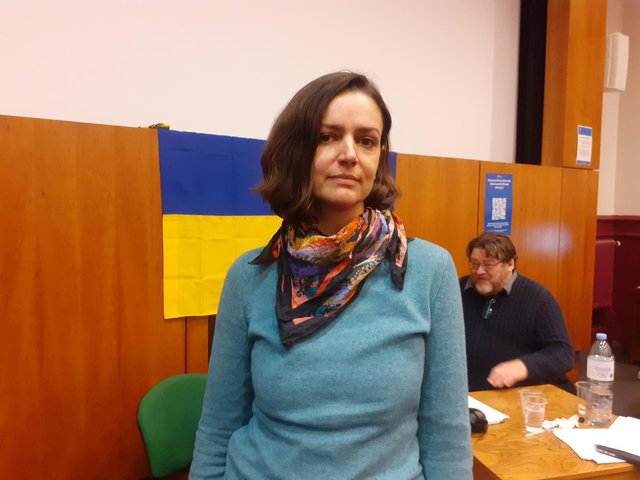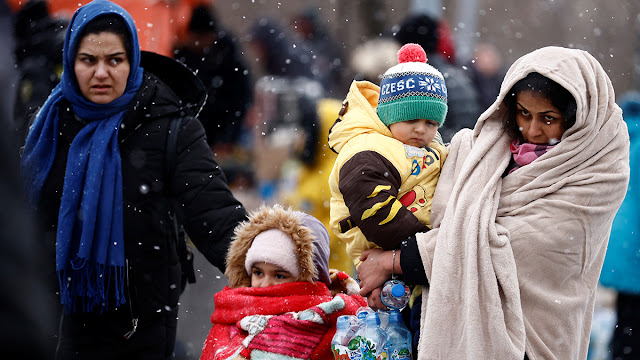It’s
National Poetry Month Again! If you have been visiting here for a
while, you know what that means—it’s our 11th annual round-up of daily
doses of verse! If you are new, here’s the scoop. Every
day all month I will feature poets and their poems. I aim
to be as broad and inclusive as possible to style, subject,
period, gender, race, and neglected voices.
I
don’t want just a parade of the usual dead white men, but a lot
of them did write some damn fine poetry, so they have their place here
too. As always, selections follow my own tastes and whims.
Yours may be different. But I am open to—eager for—suggestions,
especially for contemporary writers. I do not subscribe to dozens
of little magazines or prowl the internet for poetry posts.
I often only stumble on new and unknown poets and I am sure I miss some
great stuff. Please feel free to turn me on to some.
Here
is a challenge—Poets, send me your own best stuff be it personal,
political, or polemical. I don’t and can’t promise
to use everything. E-mail me at pmurfin@sbcglobal.net.
This
year we will segue from our March Women’s History Month posts to poetry
via the important work of Ukrainian poet Lyuba Yakimchuk whose poem Prayer
based on her personal experiences has caught the riveted
attention of readers around the world.
Yakimchuk
was born and raised in Pervomaisk, Luhansk Oblast,
a small coal-mining town near Luhansk in Ukraine’s industrial
east. She graduated from the University
of Luhansk and the National University of Kyiv-Mohyla Academy and
won early attention for her verse.
Living
and working in Kyiv (formerly known as Kiev in outdated geography
texts) the cosmopolitan national capitol. But in 2011 she happened to be home In
Pervomaisk visiting her family when ethnic Russian separatists backed
by the Putin regime in Moscow attacked and captured the
city. Her parents and sister became internally
displaced—refugees in their own country.
This
was part of the long simmering if often low-grade war for the border regions
coveted by Russia—the same one’s who “independence” was the declared
objective for Putin’s “military operation” a/k/a invasion this
year. It was also this continuing conflict
for which Ukrainian President Volodymyr Zelenskyy begged for arms
and aid from the former criminal U.S. President
who tried to use the assistance as a bribe for the Ukrainian government
digging up dirt of Joe Biden’s son Hunter. Failure to provide the aid despite
overwhelming support of Congress for it helped make Ukraine more vulnerable
to the current war.
Yakimchuk’s
book of poems, Apricots of Donbas in 2015 focused on that time
and the conflict in the area based on her own experience and eyewitness
accounts. Reviewer Maria G.
Rewakowicz in the Los Angeles Review of Books wrote that “…Yakimchuk
come[s] from the conflict-ridden Donbas and…have emerged as the region’s
trusted spokespersons.” The book
has been translated and published in Polish, Latvian,
and English and further translations are in the pipeline.
Since
then, her play The Wall was produced at the Ivan Franko
National Academic Drama Theater in Kyiv. And she wrote the script
for the film “Slovo” House: Unfinished Novel in 2021), about Ukrainian artists living
in the Slovo Building, persecuted by the Soviet totalitarianism
against the backdrop of the Holodomor—also known as the Terror-Famine
or the Great Famine, when Stalin’s policies in 1932 to 1933 killed
millions of Ukrainians in the hope of depopulating the region and replacing
its people with ethnic Russians. Yakimchuk’s
work has necessarily dealt with heavy topics.
When
the current war broke out Yakimchuk was living with her husband Max
Rosochinsky and 11 year-old son north of Kyiv. She sent her son to relatives in the
western city of Lviv. Like all
adult men her husband has stayed in country to serve in the military or
in the civilian resistance. She
has managed to travel to speak at cultural events in Paris,
Warsaw, and St. Andrews in Scotland and is rousing
support for her nation and its people.
Despite the dangers she has vowed to return to Kyiv.
Her
powerful poem Prayer was included in Apricots of Donbas. It is remarkable that she mixed sadness
and rage but also recognized the devastating costs to both
sides of the war.
The
English translation is by Oksana Maksymchuk and Yakimchuk’s husband Max
Rosochinsky both award-winning literary translators, poets, and scholars.
In 2017, they co-edited an anthology of Ukrainian poetry titled Words
for War: New Poems from Ukraine.
The Prayer
Our Father, who art in heaven
of the full moon
and the hollow sun
shield from death my parents
whose house stands in the line of fire
and who won’t abandon it
like a tomb
shield my husband
on the other side of the war
as if on the other side of a river
pointing his gun at a breast
he used to kiss
I carry on me this bulletproof vest
and cannot take it off
it clings to me like a skin
I carry inside me his child
and cannot force it out
for he owns my body through it
I carry within me a Motherland
and cannot puke it out
for it circulates like blood
through my heart
our daily bread give to the hungry
and let them stop devouring one another
our light give to the deceived
and let them gain clarity
and forgive us our destroyed cities
even though we do not forgive for them our enemies
and lead us not into temptation
to go down with this rotting world
but deliver us from evil
to get rid of the burden of a Motherland –
heavy and hardly useful
shield from me
my husband, my parents
my child and my Motherland
—Lyuba Yakimchuk




No comments:
Post a Comment